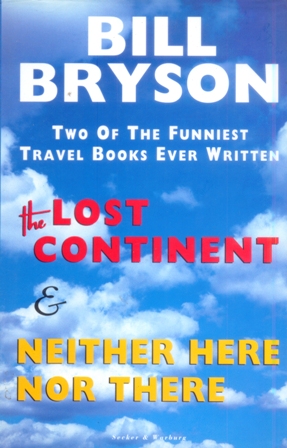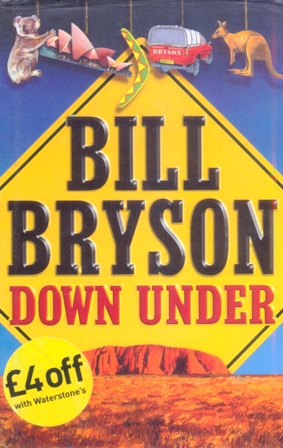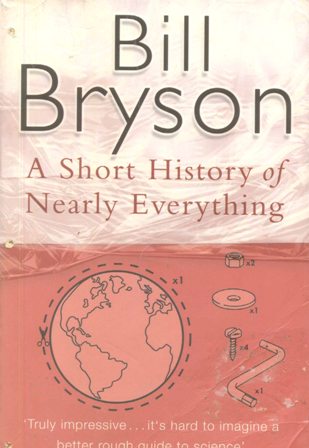-
Last Continent & Neither Here Nor There
Bill Bryson drove 14,000 miles in search of the mythical small town of his youth. Instead he found a lookalike strip of gas stations, motels and hamburger joints; a continent lost to itself through greed, pollution and television, and lost to him because he had become a foreigner in his own country. A funny and serious view of smalltown America.
-
Down Under
‘It was as if I had privately discovered life on another planet, or a parallel universe where life was at once recognizably similar but entirely different. I can’t tell you how exciting it was. Insofar as I had accumulated my expectations of Australia at all in the intervening years, I had thought of it as a kind of alternative southern California, a place of constant sunshine and the cheerful vapidity of a beach lifestyle, but with a slightly British bent — a sort of Baywatch with cricket...’ Of course, what greeted Bill Bryson was something rather different. Australia is a country that exists on a vast scale. It is the world’s sixth largest country and its largest island. It is the only island that is also a continent and the only continent that is also a country. It is the driest, flattest, hottest, most desiccated, infertile and climatically aggressive of all the inhabited continents and still it teems with life — a large proportion of it quite deadly. In fact, Australia has more things that can kill you in a very nasty way than anywhere else. This is a country where even the fluffiest of caterpillars can lay you out with a toxic nip, where seashells will not just sting you but actually sometimes go for you. If you are not stung or pronged to death in some unexpected manner, you may be fatally chomped by sharks or crocodiles, or carried helplessly out to sea by irresistible currents, or left to stagger to an unhappy death in the baking outback. Ignoring such dangers—yet curiously obsessed by them—Bill Bryson journeyed to Australia and promptly fell in love with the country. And who can blame him? The people are cheerful, extrovert, quick-witted and unfailingly obliging; their cities are safe and clean and nearly always built on water; the food is excellent; the beer is cold and the sun nearly always shines. Life doesn’t get much better than this. In the late afternoon, I stopped at a roadhouse for petrol and coffee. I studied my book of maps and determined that I would stop for the night in Hay, a modest splat in the desert a little off the highway a couple of hours down the road. As it was the only community in a space of 200 miles, this was not a particularly taxing decision. Then, having nothing better to do, I leafed through the index and amused myself, in a very low-key way, by looking for ridiculous names, of which Australia has a respectable plenitude. I am thus able to report that the following are all real places: Wee Waa, Poowong, Burrumbuttock, Suggan Buggan, Boomahnoomoonah, Waaia, Mullumbimby, Ewylamartup, Jiggalong and the supremely satisfying Tittybong. As I paid, the man asked me where I was headed. "Hay," I replied, and was struck by a sudden droll thought. "And I’d better hurry. Do you know why?" He gave me a blank look. "Because I want to make Hay while the sun shines." The man’s expression did not change. "I want to make Hay while the sun shines," I repeated with a slight alteration of emphasis and a more encouraging expression. The blank look, I realized after a moment, was probably permanent. "Aw, you won’t have any trouble with that," the man said after a minute’s considered thought. "It’ll be light for hours yet." top
-
A Short History Of Nearly Everthing
Bill Bryson describes himself as a reluctant traveller: but even when he stays safely in his own study at home, he can't contain his curiosity about the world around him. A Short History of Nearly Everything is his quest to find out everything that has happened from the Big Bang to the rise of civilization - how we got from there, being nothing at all, to here, being us. Bill Bryson's challenge is to take subjects that normally bore the pants off most of us, like geology, chemistry and particle physics, and see if there isn't some way to render them comprehensible to people who have never thought they could be interested in science. It's not so much about what we know, as about how we know what we know. How do we know what is in the centre of the Earth, or what a black hole is, or where the continents were 600 million years ago? How did anyone ever figure these things out? On his travels through time and space, he encounters a splendid collection of astonishingly eccentric, competitive, obsessive and foolish scientists, like the painfully shy Henry Cavendish who worked out many conundrums like how much the Earth weighed, but never bothered to tell anybody about many of his findings. In the company of such extraordinary people, Bill Bryson takes us with him on the ultimate eye-opening journey, and reveals the world in a way most of us have never seen it before.



